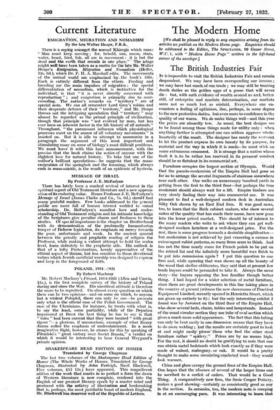Current Literature
There is a saying aniongst the nomad $hiergiZ which runs: " Man must keep moving ; for, behold, sun, moon, stars, water, beast, bird, fish, all are in movement : it is but the dead and the earth that remain in ode place."` The adage might well have been taken as a motto for the late DM- Walter Ileape's Emigration, Migration and Nomadism (Hefter, 12s. 6d.), which Dr. F. H. A. Marshall edits. The movements of the animal world are emphssizecl by..the book's title. Each is entirely different from the others. Feeding and breeding are the main impulses of migration ; the special differentiation of nomadism, which is instinctive for the individual, is that " it is never directly concerned with reproduction " ;, and emigration is primarily .due to over- crowding. The author's remarks on " territory" are of special note. We can all remember Lord Grey's robins and their desperate defence of their " territory," and Mr. Heape throws out the intriguing speculation that "• territory " may almost be regarded as the primal principle of civilization, though that principle was " not evolved by man, but has ever been an inherent factor in the life history of all animals." Throughout, " the paramount influence which physiological processes exert on the source of all voluntary movements." is insisted on. But it is idle to attempt to summarize in a paragraph the argument of this most important and stimulating essay on some of biology's most difficult problems. We must leave it with this bare announcement, with the proviso that the book claims the notice of anyone with the slightest love for natural history. To take but one of the author's brilliant speculations—he suggests that the mass- emigration of the springbok and the lemming, which always ends in mass-suicide, is the result of an epidemic of hysteria.


































 Previous page
Previous page